The word “water” in its abstract sense means the water that we drink when thirsty and use for cooking, cleaning, and many other tasks.
But sometimes we have some sentences in which this word is present, and if we search for it as its basic meaning, the sentence becomes completely incomprehensible. What do we do then to understand what the correct meaning is?
We learn about what are called “water idioms“.
Water idioms are short sentences that contain the word water, but together the sentence gives a completely different meaning than water, offering colorful ways of expressing different feelings and situations. This guide presents over 40 water-related idioms, each with its meaning and examples to help you understand and use them effectively.
Common Water Idioms and Their Meanings

- A drop in the ocean
Meaning: A very small amount compared to what is needed.
Example: Donating $10 to charity is just a drop in the ocean compared to the millions they need.
- Water under the bridge
Meaning: Something that has happened and cannot be changed.
Example: We had our differences, but that’s water under the bridge now.
- Like water off a duck’s back
Meaning: Not affected by criticism or negative comments.
Example: She ignored the insults, letting them roll off her like water off a duck’s back.
- In hot water
Meaning: In trouble or difficulty.
Example: He found himself in hot water after missing an important meeting.
- To test the waters
Meaning: To try something out before committing.
Example: She took a small role in the play to test the waters before pursuing a full acting career.
- To muddy the waters
Meaning: To make something more confusing.
Example: The new evidence only served to muddy the waters of the investigation.
- Come hell or high water
Meaning: No matter what happens.
Example: I’ll finish this project by tomorrow, come hell or high water.
- Dead in the water
Meaning: Unable to move or progress.
Example: The project was dead in the water after losing its funding.
- Still, waters run deep
Meaning: Quiet people often have deep, complex thoughts.
Example: Don’t underestimate her; still waters run deep.
- Throw cold water on something
Meaning: To criticize or stop something from happening.
Example: He threw cold water on the idea by pointing out all its flaws.
- Blow something out of the water
Meaning: To completely defeat or destroy something.
Example: Their new product blew the competition out of the water.
- Blood is thicker than water
Meaning: Family relationships are stronger than other relationships.
Example: He chose to help his brother, proving that blood is thicker than water.
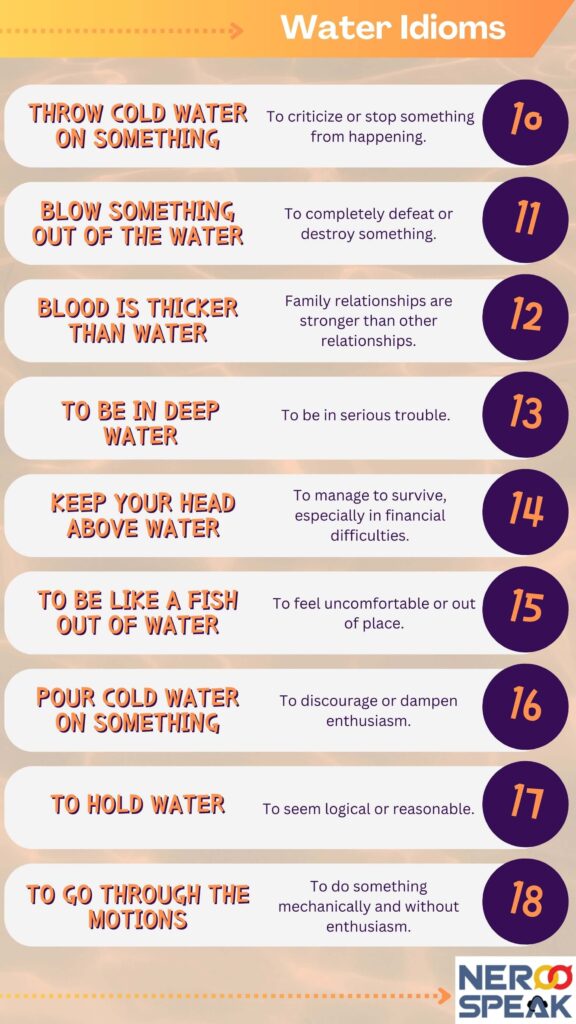
- To be in deep water
Meaning: To be in serious trouble.
Example: She realized she was in deep water when she couldn’t answer the client’s questions.
- Keep your head above water
Meaning: To manage to survive, especially in financial difficulties.
Example: Despite the high costs, they managed to keep their heads above water.
- To be like a fish out of water
Meaning: To feel uncomfortable or out of place.
Example: He felt like a fish out of water at the formal dinner.
- Pour cold water on something
Meaning: To discourage or dampen enthusiasm.
Example: The manager poured cold water on the proposal, saying it was too risky.
- To hold water
Meaning: To seem logical or reasonable.
Example: Her argument doesn’t hold water and is full of contradictions.
- To go through the motions
Meaning: To do something mechanically and without enthusiasm.
Example: He went through the motions at work, not caring about the outcome.
- To keep one’s powder dry
Meaning: To be prepared and ready for action.
Example: The team kept their powder dry until the right moment to strike.
- In the same boat
Meaning: In the same situation or predicament.
Example: We’re all in the same boat, trying to meet the deadline.
- Water off a duck’s back
Meaning: Having no effect on someone.
Example: The criticism was like water off a duck’s back to him.
- To tread water
Meaning: To make no progress.
Example: I feel like I’m just treading water in my job.
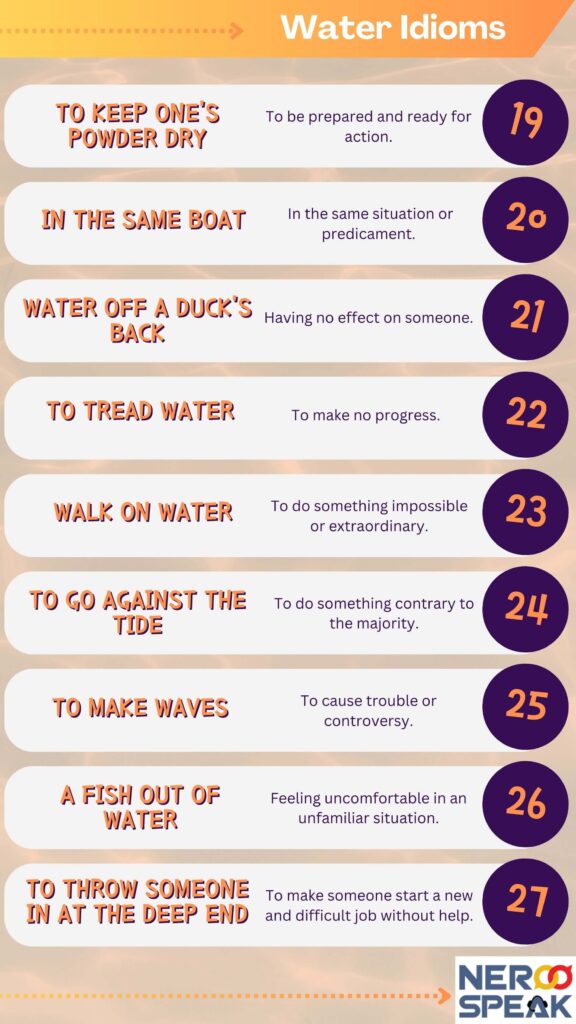
- Walk on water
Meaning: To do something impossible or extraordinary.
Example: She’s so talented, it’s like she can walk on water.
- To go against the tide
Meaning: To do something contrary to the majority.
Example: He went against the tide by choosing a different career path.
- To make waves
Meaning: To cause trouble or controversy.
Example: She made waves in the company with her new ideas.
- A fish out of water
Meaning: Feeling uncomfortable in an unfamiliar situation.
Example: He was like a fish out of water at the tech conference.
- To throw someone in at the deep end
Meaning: To make someone start a new and difficult job without help.
Example: They threw me in at the deep end on my first day at work.
- To ride the wave
Meaning: To take advantage of a trend.
Example: The company rode the wave of the new technology trend.
- Drown one’s sorrows
Meaning: To try to forget one’s problems by drinking alcohol.
Example: He went to the bar to drown his sorrows after the breakup.
- To drink like a fish
Meaning: To drink a lot of alcohol.
Example: He drinks like a fish every weekend.
- A drop in the bucket
Meaning: A very small part of something much bigger.
Example: The donation was a drop in the bucket compared to what was needed.
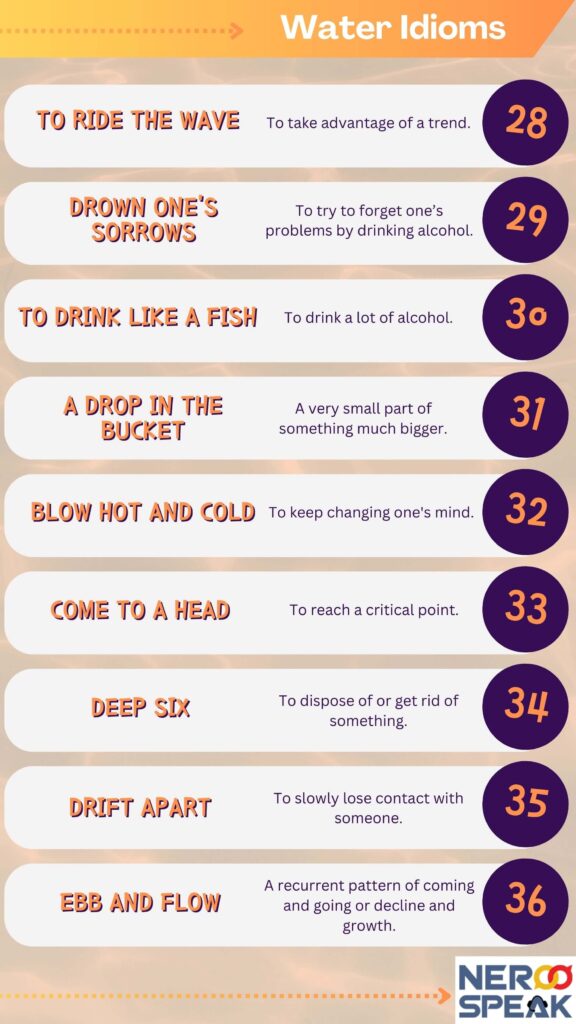
- Blow hot and cold
Meaning: To keep changing one’s mind.
Example: She blows hot and cold on the issue of moving abroad.
- Come to a head
Meaning: To reach a critical point.
Example: The situation came to a head when the employees went on strike.
- Deep six
Meaning: To dispose of or get rid of something.
Example: They decided to deep-six the old project and start a new one.
- Drift apart
Meaning: To slowly lose contact with someone.
Example: We used to be close friends, but we’ve drifted apart over the years.
- Ebb and flow
Meaning: A recurrent pattern of coming and going or decline and growth.
Example: The market has its ebbs and flows, but overall it’s growing.
- Get into hot water
Meaning: To get into trouble.
Example: She got into hot water for missing the deadline.
- Go with the flow
Meaning: To be relaxed and accept a situation without trying to change it.
Example: I decided to go with the flow and enjoy the vacation.
- Head above water
Meaning: To survive despite financial problems.
Example: Despite the debt, they managed to keep their heads above water.
- Hit the rocks
Meaning: To encounter serious problems.
Example: Their marriage hit the rocks after a year.
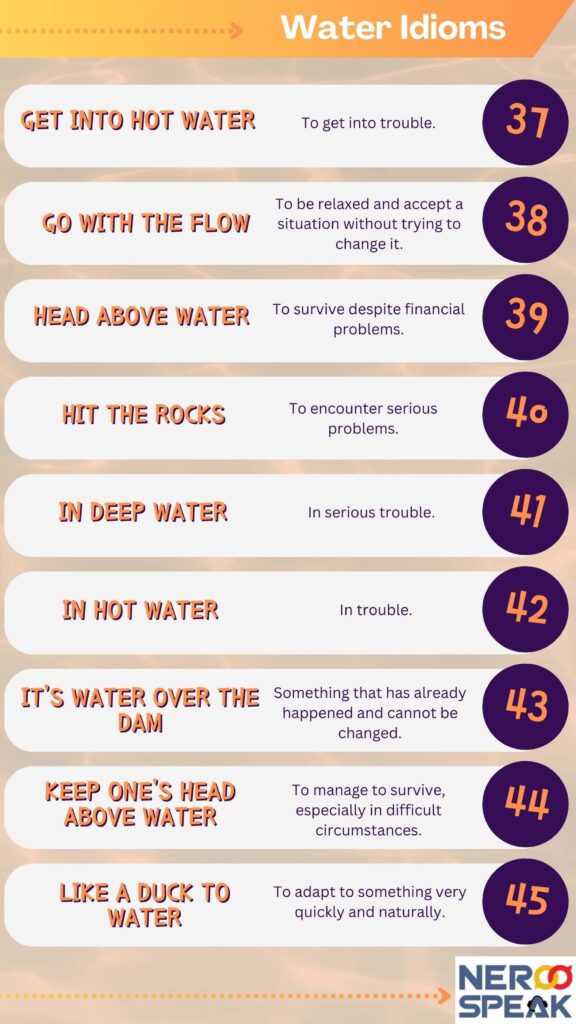
- In deep water
Meaning: In serious trouble.
Example: He realized he was in deep water with the law.
- In hot water
Meaning: In trouble.
Example: She found herself in hot water over the missing documents.
- It’s water over the dam
Meaning: Something that has already happened and cannot be changed.
Example: We had our disagreements, but it’s water over the dam now.
- Keep one’s head above water
Meaning: To manage to survive, especially in difficult circumstances.
Example: With the high rent, it’s hard to keep our heads above water.
- Like a duck to water
Meaning: To adapt to something very quickly and naturally.
Example: She took to her new job like a duck to water.
- Make waves
Meaning: To cause trouble or create a noticeable impact.
Example: He’s making waves with his innovative ideas.
- Miss the boat
Meaning: To miss an opportunity.
Example: She missed the boat on the job offer because she applied too late.
- Pour oil on troubled waters
Meaning: To calm a tense situation.
Example: He tried to pour oil on troubled waters by mediating the argument.
- Sink or swim
Meaning: To fail or succeed without help.
Example: It was a sink-or-swim situation when he started his new business.
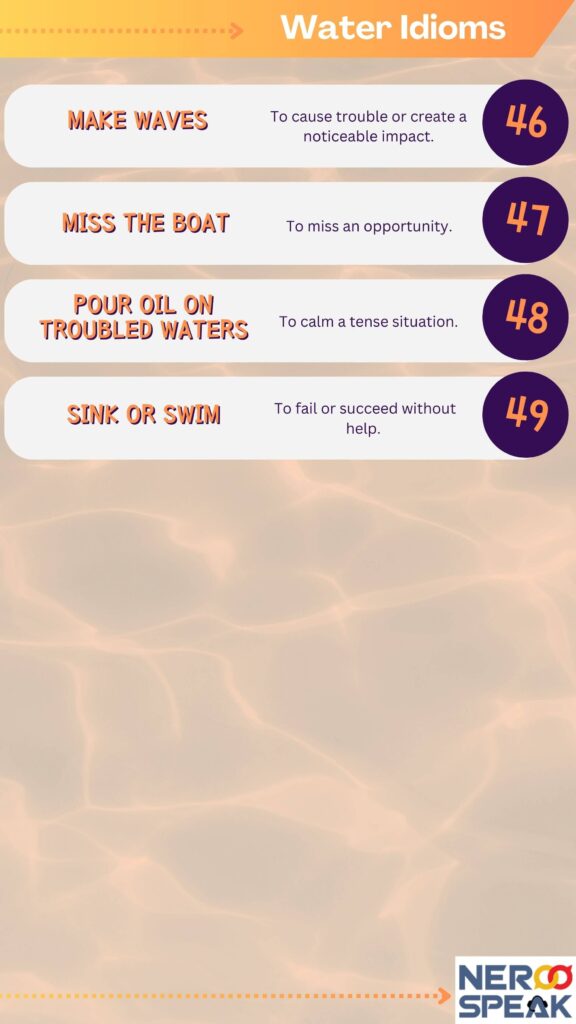
How to Use Water Idioms in Everyday Conversations
Using water idioms in everyday conversations can add color and expressiveness to your language. These idioms, such as “go with the flow” or “in hot water,” can help convey specific feelings and situations more vividly. For example, when advising someone to be adaptable, you might say, “Sometimes it’s best to just go with the flow.”
If someone is in trouble, you might comment, “He’s in hot water now.” By incorporating water idioms, you can make your speech more engaging and relatable, reflecting emotions and scenarios that everyone can understand.
Enhancing Your Writing with Creative Water Idioms
Enhancing your writing with creative water idioms can significantly enrich your narrative and convey complex ideas more vividly. Water idioms like “a drop in the ocean,” “pouring oil on troubled waters,” and “bridge over troubled water” can add depth and flair to your descriptions.
For instance, describing a small effort in a large task as “a drop in the ocean” immediately highlights the scale and challenge. Using idioms creatively can also evoke strong imagery and emotions, making your writing more engaging and memorable for your readers. Incorporating these idioms thoughtfully can transform ordinary text into a captivating story.
We hope you had a good read!!

Ali Mohammad is a SEO Specialist, Content Writer, and WEB Developer with over 4 years of experience in WEB. He has a strong background in Content Writing gained through SEO Companies. He holds a Master Degree in Communications Engineering from Tishreen University and is a certified professional. Ali is passionate about Business and Engineering and enjoys helping readers by sharing his knowledge.